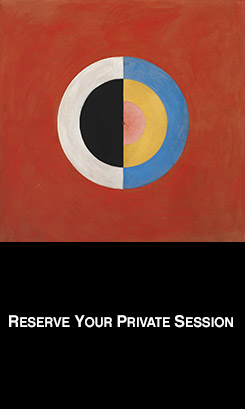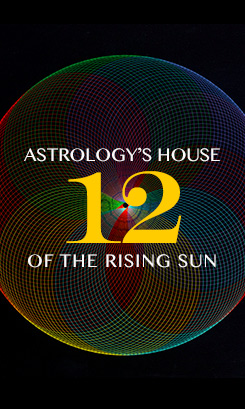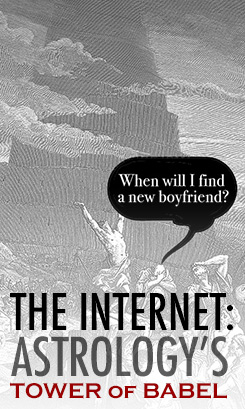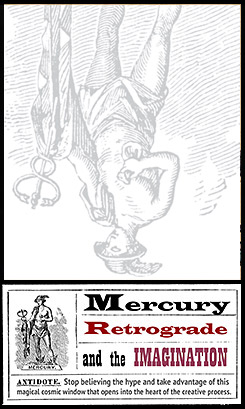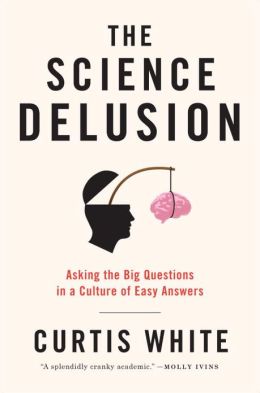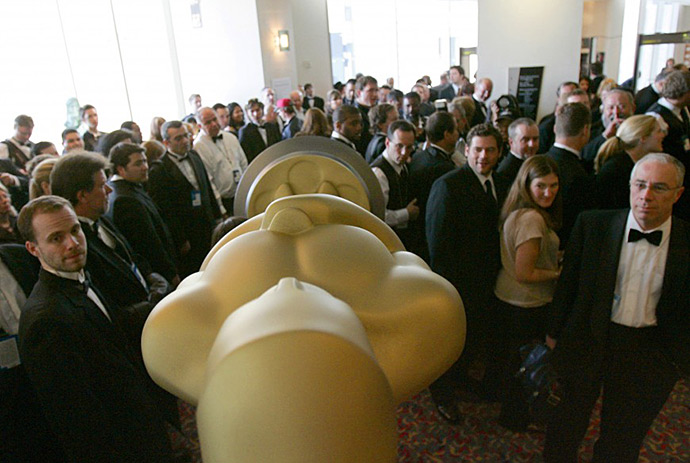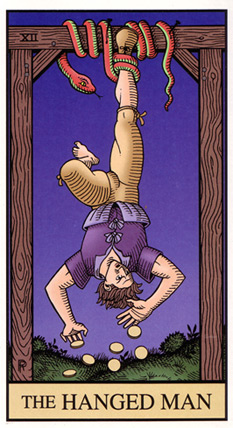Two Birds: Swami Vivekananda
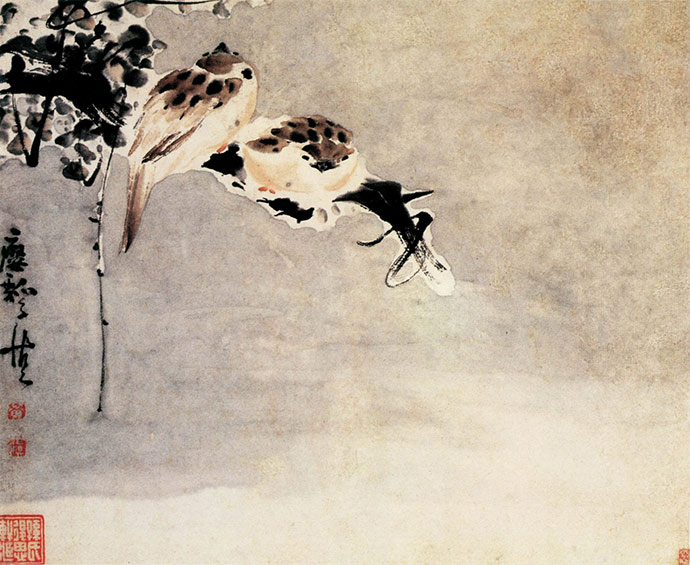
Two birds of golden plumage sat on the same tree. The one above, serene, majestic, immersed in his own glory; the one below restless and eating the fruits of the tree, now sweet, now bitter.
Once he ate an exceptionally bitter fruit, then he paused and looked up at the majestic bird above; but he soon forgot about the other bird and went on eating the fruits of the tree as before.
Again he ate a bitter fruit and this time he hopped up a few boughs nearer to the bird at the top.
This happened many tines until at last the lower bird came to the place of the upper bird and lost himself. He found all at once that there had never been two birds, but that he was all the time that upper bird, serene, majestic and immersed in his own glory.
— Swami Vivekananda, Meditation and its Methods
Painting by Huang Shen (1687-1771)
What I’ll be Reading This Month

Bumbling around the web tonight, drinking tea and trying not to disturb the cat while she teetered on one of my thighs, while the laptop teetered on the other, I encountered a slew of articles that irritated the shit out of me.
The first one was over on Salon, where it discussed how tech corporations are attempting to co-opt the practice of Buddhist meditation to up the well-being and job performance of their employees. Reading that felt like chewing on a piece of tin foil. I recoiled and started doing a bit more research and discovered this statement from Google’s Search Inside Yourself Leadership Institute website:
“Developed at Google and based on the latest in neuroscience research, our programs offer attention and mindfulness training that build the core emotional intelligence skills needed for peak performance and effective leadership. We help professionals at all levels adapt, management teams evolve, and leaders optimize their impact and influence.”
Uhm…OK…
So now mindfulness is enabling corporations to “optimize impact�
That’s just what I want more of in my life — corporate optimization.
And I echo culture critic Curtis White‘s response, when he noted:
“In this view of things, mindfulness can be extracted from a context of Buddhist meanings, values, and purposes. Meditation and mindfulness are not part of a whole way of life but only a spiritual technology, a mental app that is the same regardless of how it is used and what it is used for.”
Having read that quote I went on a search for the interview the quote was lifted from, and I found it here, titled The Science Delusion, over on Tricycle.
You need to read it to understand the particular gulf we live in today. Especially if you are a young person contemplating your future. The implications for the arts and humanities are disturbing, unless of course your only aim is to have a tremendous amount of followers on YouTube because you’re able to shill Doritos to your followers and then Frito-lay cuts you a check (depending on the number of video views, of course). See Frontline’s Generation Like for more insights into that nightmare.
And then Consider White’s ideas here, from the same Tricycle interview. And then buy his book.
“Anyone who doubts the seriousness of this vision should read David Brooks’s December 2013 column for The New York Times “Thinking for the Future,†in which he predicts that the economy of the future will depend upon “mechanized intelligence.†Fifteen percent of the working population will make up a mandarin class of computer geeks and the “bottom 85%†will serve them as “greeters†or by doing things like running food trucks. And yet, Brooks claims, this vast class of servants will have “rich lives†that will be provided for them by the “free bounty of the Internet.†“
Oscar’s Glamour and the New Slave State
The Oscars is never a one-day happening.Â
There’s the day before, when all of the Xanax supply in Hollywood is emptied out to oblivion, sending Pfizer’s stock to the moon. And where the plebeians plan their evening and guest list around the event. Like the Pope coming to town, for the Catholics who like to tailgate.
And then there’s the day of — where, once again, the collective mindset has revealed to its bad self that — albeit unconsciously — Hollywood (well, Los Angeles really) is not just a city but an entire thought-form that has replaced the spiritual instinct for most Americans. “I’m headin’ West, gonna become a star!”
From the blue whales in the Ocean of Auteurs, to the krill that hanker each week for the kitsch of The Real Housewives of Orange County — no one escapes what occultist Alice Bailey deemed in her book (titled the same): Glamour — A World Problem.
Now, this of course is different on the East Coast, where it is DC that holds the lure. But DC’s a version of power and fame that skirts very close to a sort of primal/tribal evil — so it isn’t as sparkly and ‘fun’, but as a bloodsport we Americans do honor it, but not in the line of beauty, the way we do Los Angeles. As Clinton-Gore strategist Paul Begala once noted: “Washington is Hollywood for ugly people.”
And then there is the day after the Oscars, which many of us have lived through today. It’s rare to hear someone announce and be proud of it, like in the old days, that they don’t own a television or “I never watch the Academy Awards.” Even when I do hear that, I sense lying and perhaps shame, in the same way I’m certain the parents of the Little Match Girl didn’t want that story leaked or linked to their family line. Read more
Time and the Retrograde of Mars and Saturn
To stall is to procrastinate. That’s the usual association we make with the word. And procrastination implies a conscious kind of non-action on the part of the procrastinator.
But there is another definition taken from the world of aviation. A mechanical stall is a malfunction in the flight of an aircraft in which there is a sudden loss of lift that results in a downward plunge. “The plane went into a stall and I couldn’t control it.”
Can you relate?
With both Saturn (the prime timekeeper) and Mars (momentum itself) in retrograde motion, our direction, our sense of time, our desire (Mars) for a forward direction (Saturn) — all of our leaning toward and lunging for is, well, suspended — left dangling. So when someone asks you, “What are you up to?” You can say, in all honesty, “Just hanging around.” Or if you’re a more melodramatic type: “Man, I’m going down.”
So, while you’re falling why not pick a card — any card.
Of all the various versions of the Tarot’s Hanged Man (Pamela Colman Smith’s glowing, haloed figure or Aleister Crowley‘s eerie ankh-hung Spiderman) I like the simplicity of Robert Place‘s rendering — taken from his Alchemical Tarot deck. I also think Place’s Hanged Man is more true to the initial stages of frustration one experiences when she first notices that her airplane has gone into a stall.
Place animates his Hanged Man with a thrashing motion of the body and an angry, perplexed countenance. The man is definitely rebelling. And all that he has acquired within the normal, forward motion of time, is falling from his hands. Read more
Living the Dream
A woman novelist said to Gurdjieff at one meeting:
“I sometimes feel that I am more conscious when I am writing. Is this so or do I imagine it?”
He replied:
“You live in dreams and you write about your dreams. Much better for you if you were to scrub one floor consciously then to write a hundred books as you do now.”
— C.S. Nott from Teachings of Gurdjieff: A Pupils Journal
Large Meteor Spears the Galactic Center

The photography of Chris Thorne is phenomenal. He describes the above picture as:
“View is over a small farm dam looking towards the Aboriginal Emu constellation in the lower south west of Western Australia. Part of a time-lapse sequence.”
I describe ig as yet another glimpse into what unbounded wonder looks like. Something similar to sitting in the very cauldron of creation.
I wonder if our own individual conceptions were anything like this? What do you think?









